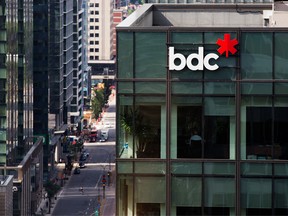BDC is launching a therapy program for clients as mental health scores deteriorate
Reviews and recommendations are unbiased and products are independently selected. Postmedia may earn an affiliate commission from purchases made through links on this page.
Article content
Almost half of Canadian entrepreneurs are experiencing mental health challenges, according to a new Business Development Bank of Canada (BDC) report, prompting the Crown corporation to ready a therapy program for its clients.
Advertisement 2
Article content
Forty-five per cent of business owners said they “had felt mental health challenges/needs,” and 48 per cent said they “felt depressed and less accomplished” than they would have liked in the past two weeks. (Most of the responses were gathered in late February.)
Article content
“We were really hoping this year that the situation would have improved because last year it was already quite concerning, but it actually is worse,” said Annie Marsolais, chief marketing officer at BDC, which has a mandate from the federal government to lend to small businesses and entrepreneurs.
Article content
The findings shed light on the human cost of an extended period of high inflation, rising interest rates and slowing economic growth. Forty-five per cent of respondents said “economic slowdown or recession” was one of their sources of stress, and four of the five biggest concerns related to business and finances.
Article content
Advertisement 3
Article content
Marsolais said BDC will launch a mental health program sometime in the fall, likely October, for the 65,000 Canadian entrepreneurs who have direct relationships with the bank.
In last year’s report, 38 per cent of business owners said they faced mental health challenges, while 43 per cent responded that they felt depressed and accomplished less than they would have liked.
Dan Kelly, head of the Canadian Federation of Independent Business, said the findings are sad, but that he’s not surprised, particularly considering the economic highs and lows that came about from the pandemic, and the mental burdens entrepreneurs felt as a result.
“The cost increases have gone through the roof and so that puts many of them into a loss rather than a profit,” Kelly said.
Advertisement 4
Article content
Fifty-four per cent of respondents said inflation was a source of stress, making it the top concern from a list of 19 choices.
Since April 2021, inflation has remained outside the central bank’s target of between one and three per cent and peaked above eight per cent in June, the highest in 40 years.
The Bank of Canada raised interest rates in response, and inflation now is hovering around four per cent. But that improvement came after the central bank increased the benchmark rate by 4.25 percentage points in the span of a year, and policymakers say they have no intention of lowering rates anytime soon.
People forget that “tens of thousands of businesses were unable to open their doors for 430 days” as the government mandated lockdowns, preventing owners from conducting business “as they knew” before the onset of COVID-19, Kelly said.
Advertisement 5
Article content
And being an entrepreneur dealing with stress, especially when it relates to one’s business, can be lonely.
“You don’t want to talk to your employees about it for fear that they’re going to freak out and potentially leave,” Kelly said. “You might be hesitant to talk to your spouse for fear that then they start to worry about it because their financial wellbeing is dependent on the business itself.”
The tight labour market also is a factor in the mental well-being of business owners, Marsolais said.
“They have to put in more hours … they need to be very creative to find the right workforce strategy or automating their businesses,” she said. “This is why only a third of entrepreneurs say they’re satisfied with their mental health because they’re struggling from so many fronts.”
Advertisement 6
Article content
The report said women, business owners under 45 years of age and people belonging to marginalized groups were more likely to seek professional help, while men, older business owners and “non-members of a diversity group” were less likely to do so.
-

Small businesses struggle with inflation as loans come due
-

Tsunami of small business owners plan to exit with $2 trillion on line
-

Small business owners switch banks due to poor customer service
Marsolais said the BDC’s mental health program will offer partially subsidized therapy sessions through a virtual mental health provider. More details will be available when the initiative is launched, she said.
BDC surveyed 1,500 business owners from Feb. 20 to March 3. The survey has a margin of error of plus/minus 2.5 per cent, 19 times out of 20.
• Email: bbharti@postmedia.com | Twitter: biancabharti
Small business owners’ mental health getting worse: BDC
2023-05-10 10:00:32






Comments
Postmedia is committed to maintaining a lively but civil forum for discussion and encourage all readers to share their views on our articles. Comments may take up to an hour for moderation before appearing on the site. We ask you to keep your comments relevant and respectful. We have enabled email notifications—you will now receive an email if you receive a reply to your comment, there is an update to a comment thread you follow or if a user you follow comments. Visit our Community Guidelines for more information and details on how to adjust your email settings.
Join the Conversation